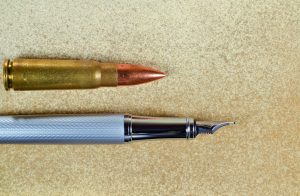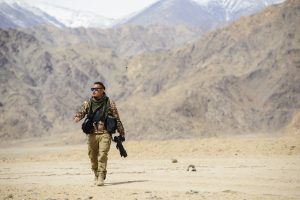No matter the location, journalists who report from conflict zones are in grave physical danger – and by extension, at high risk for conditions like PTSD and depression.

Pen and a bullet arranged horizontally symbolize the confrontation between the power of the written word and the power of weapons and politics.
In May 1999, Dr. Anthony Feinstein, a neuropsychiatrist at Sunnybrook Health Sciences Centre in Toronto, was treating a patient who was having difficulty speaking and drifting in and out of consciousness. A stroke had been ruled out, and Dr. Feinstein began to realize that her symptoms were being caused by extreme stress.
Once the patient regained her speech, Dr. Feinstein learned she was a frontline journalist who had been covering a famine in East Africa where she had witnessed death and suffering on a biblical scale. When her cameraman was killed in a famine-related riot, she resorted to alcohol to steady her nerves. Upon her return to Canada, the symptoms that brought her into hospital began.

“Dr. Feinstein has shifted the way news organizations think of psychological trauma, in the process helping untold numbers of journalists.” – Journalist
As Dr. Feinstein got to know his patient better, he was intrigued by something she revealed. She knew that she needed psychological help, but she failed to seek it because she was worried that doing so could compromise her career. “You don’t understand my profession, doc” she confided. “The first sign of a weakness like this and you will never be sent out into the field again. I love my work and did not want to sacrifice my career.”
New Explorations
Taken aback, Dr. Feinstein decided to explore the psychiatric literature devoted to journalists, war and emotional health. While he uncovered a vast body of work devoted to emotional trauma in soldiers, firefighters, police, and victims of rape, assault and motor vehicle accidents, to his amazement, he could not find a single publication on war and conflict journalists.
This discovery would change the focus of Dr. Feinstein’s work and take him on a path he could not imagine. He undertook the very first study describing the emotional health of journalists who define their careers by their work in war zones, and it revealed that in fact they suffer from high lifetime rates of PTSD and depression.
The paper was picked up by the New York Times, and suddenly news organizations became more interested in the psychological well-being of their journalists who were being sent to work in the world’s most dangerous places. Following the 9/11 attacks and the start of the war in Iraq in 2003, news organizations began asking Dr. Feinstein to provide counselling to their staff who needed it and advise on things like whether embedding journalists in military units was psychologically harmful or helpful. Soon thereafter, he was approached by UNESCO to undertake a study looking at the emotional health of Mexican journalists covering the drug wars in their country. He has since completed studies in Kenya, Iraq, Syria, Afghanistan and in Europe in relation to the migration crisis.
His research has encompassed over 1,000 frontline journalists and eventually led to the production of the 2011 film ‘Under Fire’, which was longlisted for an Academy Award. His current work is focused on helping Afghan journalists in light of the recent takeover by the Taliban. He recently wrote, directed and produced the short documentary “A Quiet Courage: Afghan Journalists in a Time of Terror” in order to raise awareness of the plight of Afghan journalists.
Equal Impacts – Unequal Resources
The most important and consistent finding was that no matter the geographical location of a conflict, the journalists who report it are in grave physical danger and, by extension, at high risk for conditions like PTSD and depression.

Migrants arriving by boat from Turkey to Lesbos Greece accompanied by journalists.
While many Western news organizations now recognize the importance of keeping their journalists both physically and emotionally safe, the same cannot always be said for non-Western news outlets, where the subject of mental health in journalists is not even discussed. Assistance is simply not provided to journalists who are being asked to undertake important and extremely hazardous work.
Further compounding this situation are the increasing dangers to the media in places like Syria and Afghanistan, where the kidnapping of journalists has become a new concern. Many Western news groups are reluctant to send their own journalists to such places, relying instead on local journalists and freelancers to gather the news. Little if any mental health support is available for these men and women.
A Global Concern – Why is this topic important?
In a global economy and a world that is increasingly interconnected via social media, we cannot ignore events far from our shores that have the potential to affect us all. If we want to understand why men willingly fly planes into skyscrapers in the midst of a great city, we need to know what is going on globally. Journalists keep us informed; but good journalism relies on healthy journalists. Trauma, stress, depression, substance abuse, PTSD…even one of these can have disastrous consequences on someone’s well-being.

“Dr. Feinstein’s work is shining a light into some very dark, overlooked places.”
– Journalist
A Global Approach
The good news is that these conditions are treatable, and Myriad Canada is working with Dr. Feinstein to provide short-term psychotherapy for journalists who work in conflict zones, giving them tools to manage their current and future mental health needs.
Large networks around the globe help to identify local journalists who may need therapy. The therapy is offered in the journalists’ language of choice and every effort is made to match the journalists with therapists both linguistically and culturally. In the event that a local therapist cannot be found, remote assistance is provided by therapists who reside elsewhere.

